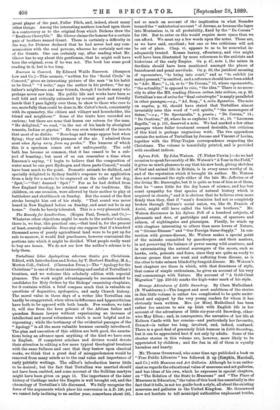Emerson in Concord. By Edward Waldo Emerson. (Sampson Low and
Co.)—This memoir, "written for the ' Social Circle' in Concord," gives an interesting picture of the man "in his habit as he lived." " I write," says the author in his preface, "for my father's neighbours and near friends, though I include many who perhaps never saw him. His public life and works have been so well told and critically estimated by several good and friendly hands that I pass lightly over them, to show to those who care to see, more fully than could be done in Mr. Cabot's book, consistently with its symmetry, the citizen and villager and householder, the friend and neighbour." Some of the traits here recorded are curious; but there are none that lessen our esteem for the man. "He delighted," we read, "in the use of his lands by aboriginal tenants, Indian or gipsies." He was even tolerant of the insects that most of us dislike. " Rose-bugs and wasps appear best when flying; they sail like little pinnaces of the air. I admired them most when flying away from my garden." The humour of which this is a specimen comes out not unfrequently. The cold bath has become so common, that it has ceased to be a sub- ject of boasting; but most of us can remember a time when Emerson's saying, " I begin to believe that the composition of water must be one part Hydrogen and three parts Conceit," would have been much to the point. Domestic animals he disliked, and specially delighted in Sydney Smith's response to an application from a lady for a motto to be engraved on the collar of her dog, Spot,'—" Out ! damned ' Spot !' " Far as he had drifted from New England theology, he retained some of its traditions. His children, on one occasion, were allowed by their mother to play at battledore and shuttlecock on Sunday. But the sound of the first
. stroke brought him out of his study. " That sound was never heard in New England before on Sunday, and must not be in my house." Cards he barely tolerated. This is a very pleasant book. The Remedy for Landlordism. (Kegan Paul, Trench, and Co.)— Whatever other objections might be made to the author's scheme, there is, we fear, this practical one,—that land is, for the present at least, scarcely saleable. Does any one suppose that if a hundred thousand acres of purely agricultural land were to be put up for sale to-morrow, it would find purchasers, however convenient the portions into which it might be divided. What people really want to buy are houses. We do not see how the author's scheme is to help them.






































 Previous page
Previous page